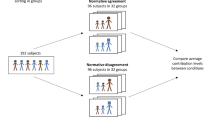Abstract
This article analyzes the optimal composition of groups of arbitrary size according to the social preferences of group members in a situation of moral hazard. We focus on rivalry, pure self-interest and altruism to show that in a situation where every group member compares his or her remuneration to the average remuneration of all members in the same group, ideally there should be as many extreme altruists as there are extreme rivals. If, by contrast, every member of the group compares his or her own remuneration to that of a focal agent, ideally, this focal agent should be a strong altruist, while all other group members should be highly competitive. Our results show that it is important to foster heterogeneity in the social preferences of the members of a group in order to maximize the profitability of the firm.
Similar content being viewed by others
References
Bartling B, von Siemens F (2010a) Equal sharing rules in partnerships. J Inst Theor Econ 166: 299–320
Bartling B, von Siemens F (2010b) The intensity of incentives in firms and markets: Moral Hazard with evious agents. Labour Econ 17: 598–607
Benjamin DJ, Choi JJ, Strickland AJ (2010) Social identity and preferences. Am Econ Rev 100: 1913–1928
Berthel J, Becker FG (2007) Personal-Management: Grundzüge für Konzeptionen betrieblicher Personal-arbeit, 8th edn. Schäffer-Poeschel, Stuttgart
Birnberg JG, Luft J, Shields MD (2007) Psychology theory in management accounting research. In: Chapman CS, Hopwood AG, Shields MD (eds) Handbook of management accounting research, vol I, Elsevier, Oxford, pp. 113–135
Blau FD, Kahn LM (2007) The gender pay gap: have women gone as far as they can?. Acad Manag Persp 21: 7–23
Bolton GE, Ockenfels A (2000) ERC: a theory of equity, reciprocity and competition. Am Econ Rev 90: 166–193
Camerer CF, Fehr E (2004) Measuring social norms and preferences using experimental games. A guide for social scientists. In: Henrich J, Boyd R, Bowles S, Camerer CF, Fehr E, Gintis H (eds) Foundations of human sociality. Economic experiments and ethnographic evidence from fifteen small-scale societies. Oxford University Press, Oxford, pp 55–96
Demougin D, Fluet C (2006) Group vs. individual performance pay when workers are envious. In: Demougin D, Schade C (eds) Contributions to entrepreneurship and economics. First Haniel-Kreis meeting on entrepreneurial research. Duncker & Humblot, Berlin, pp 39–47
Demougin D, Fluet C, Helm C (2006) Output and wages with inequity averse agents. Can J Econ 39: 399–413
Dierkes S, Harreiter B (2010) Soziale Präferenzen und relative Leistungsbewertung. Eine agency-theoretische Analyse. Betriebswirtschaftliche Forschung und Praxis 62: 534–557
Dur R, Glazer A (2008) Optimal contracts when a worker envies his boss. J Law, Econ Org 24: 120–137
Englmaier F, Wambach A (2010) Optimal incentive contracts under inequity aversion. Games Econ Behav 69: 312–328
Fehr E, Schmidt KM (1999) A theory of fairness, competition and co-operation. Quart J Econ 114: 817–868
Fehr E, Schmidt KM (2003) Theories of fairness and reciprocity: evidence and economic applications. In: Dewatripont M, Hansen LP, Turnovsky SJ (eds) Advances in economics and econometrics, 8th World Congress, Cambridge, pp. 208–257
Fershtman C, Hvide H, Weiss Y (2003) A behavioral explanation of the relative performance evaluation puzzle. Anna d’Econo Stat 71–72: 349–361
Fershtman C, Hvide H, Weiss Y (2006) Cultural diversity, status concerns and the organization of work. Res Labor Econ 24: 361–396
Festinger L (1954) A theory of social comparison processes. Hum Relat 7: 117–140
Grund C, Sliwka D (2005) Envy and compassion in tournaments. J Econ Manag Strat 14: 187–207
Güth W, Schmidt C, Sutter M (2007) Bargaining outside the lab: a newspaper experiment of a three-person ultimatum game. Econ J 117: 449–469
Itoh H (2004) Moral Hazard and other-regarding preferences. Jap Econ Rev 55: 18–45
Krapp M (2000) Kooperation und Konkurrenz in Prinzipal-Agent-Beziehungen. Deutscher Universitäts-verlag. Gabler, Wiesbaden
Krapp M (2004) Team-Entlohnung: Vergütungsstruktur und Implikationen für die Organisationsgestaltung. Zeitschrift für Betriebswirtschaft. Ergänzungsheft 2: 49–77
Küpper H-U, Sandner K (2008) Differences in social preferences: are they profitable for the firm?. Working Paper, University of Munich
LePine JA, Hollenbeck JR, Ilgen DR, Hedlund J (1997) Effects of individual differences on the performance of hierarchical decision-making teams: much more than g. J Appl Psychol 82: 803–811
Mayer B (2006) Prinzipien der Anreizgestaltung bei sozialen Interaktionen. Eine theoriegeleitete Analyse. Unpublished dissertation
Mayer B, Pfeiffer T (2004) Prinzipien der Anreizgestaltung bei Risikoaversion und sozialen Präferenzen. Zeitschrift für Betriebswirtschaft 74: 1047–1075
Neilson WS, Stowe J (2010) Piece rate contracts for other-regarding workers. Econ Inq 48: 575–586
Neumann GA, Wright J (1999) Team effectiveness: beyond skills and cognitive ability. J Appl Psychol 84: 376–389
Ockenfels A (1999) Fairness, Reziprozität und Eigennutz. Ökonomische Theorie und experimentelle Evidenz. Mohr Siebeck, Tübingen
Rey Biel P (2008) Inequity aversion and team incentives. Scand J Econ 110: 297–320
Rob R, Zemsky PB (2002) Social capital corporate culture and incentive intensity. RAND J Econ 33: 243–257
Sandner KJ (2008) Behavioral contract theory: Einfluss sozialer Präferenzen auf die Steuerung dezentraler Organisationseinheiten. Duncker & Humblot, Berlin
Sandner KJ (2009) Impacts of rivalry on types of compensation: competition vs. co-operation between multiple agents under technological interdependencies. Zeitschrift für Betriebswirtschaft 79: 427–472
Wiendieck G (1992) Teamarbeit. In: Freese, E (ed) Handwörterbuch der Organisation, 3rd edn. Schäffer-Poeschel, Stuttgart, pp. 2375–2384
Zahidi S, Ibarra H (2010) The corporate gender gap report 2010. World Econ Forum, Geneva
Ziller RC (1972) Homogeneity and heterogeneity of group membership. In: McClintock CG (ed) Experimental social psychology. Holt, Rinehart & Winston, New York, pp. 385–411
Author information
Authors and Affiliations
Corresponding author
Rights and permissions
About this article
Cite this article
Brunner, M., Sandner, K.J. Social comparison, group composition, and incentive provision. Int J Game Theory 41, 565–602 (2012). https://doi.org/10.1007/s00182-011-0303-9
Received:
Accepted:
Published:
Issue Date:
DOI: https://doi.org/10.1007/s00182-011-0303-9




